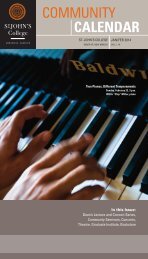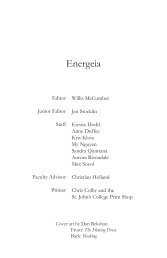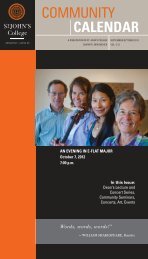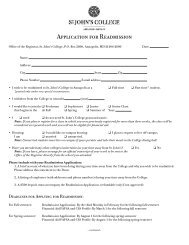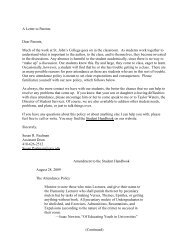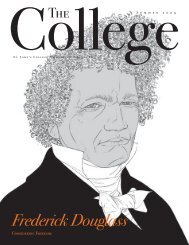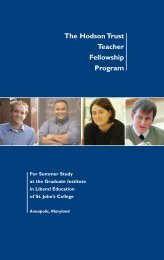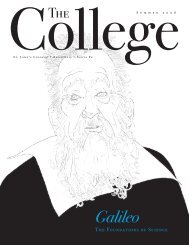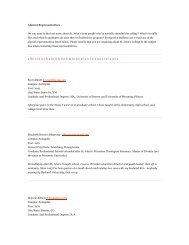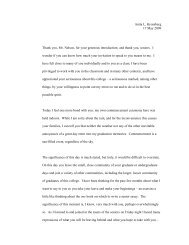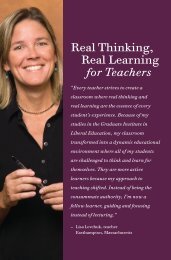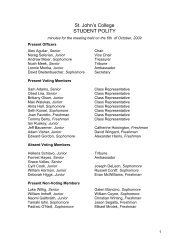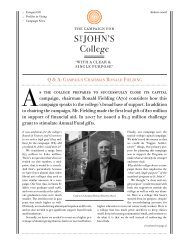âTo Meet with Macbeth,â given by tutor Louis ... - St. John's College
âTo Meet with Macbeth,â given by tutor Louis ... - St. John's College
âTo Meet with Macbeth,â given by tutor Louis ... - St. John's College
You also want an ePaper? Increase the reach of your titles
YUMPU automatically turns print PDFs into web optimized ePapers that Google loves.
Whose voices I desire aloud <strong>with</strong> mine:<br />
Hail, King of Scotland!<br />
This time they respond on cue <strong>with</strong> the expected third hail:<br />
All.<br />
Hail, King of Scotland!<br />
(V.viii.54-59)<br />
It is important that the head be seen as <strong>Macbeth</strong>’s head. Let the squeamish shut their eyes if they must,<br />
while the rest ponder their last meeting <strong>with</strong> <strong>Macbeth</strong>. 14<br />
Malcolm closes the action <strong>with</strong> a sixteen-line oration consisting of three interwoven sections<br />
and two final rhymed couplets that clearly recalls the form and matter of the opening prologue. He<br />
promises (i) to “reckon” and “make even” “your several loves” in short time; (ii) to plant “newly <strong>with</strong> the<br />
time” <strong>by</strong> “calling home our exiled friends” from abroad and (iii) “producing forth” at home the “cruel<br />
ministers” of “this dead butcher and his fiendlike queen”; and (first couplet) <strong>by</strong> “the grace of Grace” to<br />
perform “what needful else” “in measure, time, and place” (V.viii.60-73). That much, which is fourteen<br />
lines, should have been the final and fair-sounding words in a form we recognize, for the time is indeed<br />
free when Grace comes to the King <strong>with</strong>out call but <strong>by</strong> grace. But what if God’s grace does not come?<br />
<strong>Macbeth</strong>’s head stands there still, and so Malcolm adds an extra couplet to supply something else that is<br />
missing from the action of this play—the actual crown:<br />
“So thanks to all at once and to each one,<br />
Whom we invite to see us crowned at Scone.<br />
Flourish. Exit all.<br />
(V.viii.74-75)<br />
The “all at once” and the “oneness of each” that <strong>Macbeth</strong> and his Lady tried so hard to clutch for<br />
themselves become for Malcolm mere spectators, told where to meet next and what to see—him,<br />
14 To the cauldron of once living parts, the published versions of Shakespeare’s stage plays, we all may go safely to<br />
ask our questions and take our answers. But it would also be good, if not better, to witness the living plays at the<br />
playhouse, though this is not so safe a mode of meeting <strong>Macbeth</strong>. The spirits of this play come to live inside those<br />
who hear and call them as if for real.<br />
58



